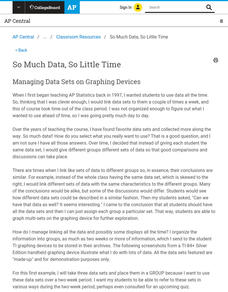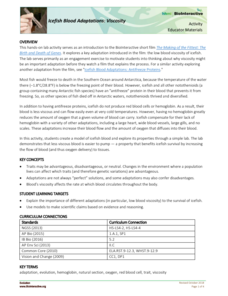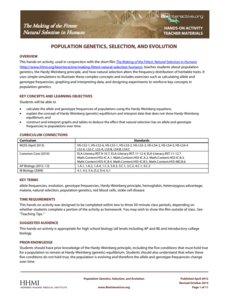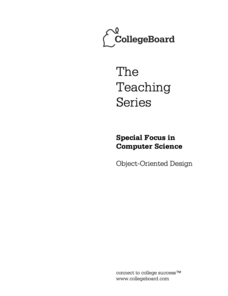Judicial Learning Center
Your 1st Amendment Rights
Why should classes care about the First Amendment? An engaging lesson serves as a powerful tool for answering just that. As all four cases in the lesson relate directly to freedom of expression in schools, young scholars explore the...
Judicial Learning Center
Types of Court Cases
How can one court acquit someone of a crime, while another convicts the person of the same one? It's all because of the differences between civil and criminal trials. An informative resource provides scholars in the field of criminology...
Judicial Learning Center
Getting Ready for Trial
A courtroom can be a scary place for the uninitiated. Get familiar with the process using a helpful overview of the activities that take place prior to both civil and criminal cases. The lesson explains the differences between civil and...
Judicial Learning Center
Judicial Independence
Most people support the idea of an independent judiciary in theory until they hear about a court case that violates their principles. An informative resource explains why the concept is important. It also provides scholars of criminology...
Judicial Learning Center
About Federal Judges
Not just anybody can do the job of a federal judge, but according to the United States Constitution just about anybody can be appointed. The lesson outlines the process and requirements for becoming a federal judge, focusing on the...
College Board
So Much Data, So Little Time
Organizing data in a statistics class is often a challenge. A veteran statistics teacher shares data organization tips in a lesson resource. The instructor shows how to group data to link to individual calculators in a more efficient...
College Board
Coke® Versus Pepsi®: An Introductory Activity for Test of Significance
Most people claim they can tell the difference between Coke and Pepsi. Scholars conduct a fun experiment to test that claim! Once learners collect their data, they analyze the results and determine if the statistics are significant.
Howard Hughes Medical Institute
Icefish Blood Adaptations: Viscosity
Most fish freeze to death when the water is too cold, yet some fish live in the Southern Ocean where the water is often below freezing. Scholars use two models representing the blood from most fish versus the blood from Antarctic fish....
Howard Hughes Medical Institute
How Do Fibers Form?
The proteins inside a cell determine the shape of the cell. While most red blood cells have a circular shape, those with sickle cell take the shape of a sickle. This change in shape causes multiple issues in the system. Scholars solve...
Howard Hughes Medical Institute
Population Genetics, Selection, and Evolution
The Hardy-Weinberg principle states that alleles and genotypes remain constant in the absence of evolutionary influences. Scholars complete a simple hands-on activity applying the Hardy-Weinberg principle to sample data. They observe how...
College Board
Strategies for Teaching AP Computer Science
Implement strategies from the beginning to the end. A collection of strategies and lessons span from the first day of school to after the exam. Resources cover basic information such as computer ethics and top 10 tips to a instructional...
College Board
GridWorld Case Study
The gridline is not just for Friday. Created for the first year, the GridWorld case study was part of the Computer Science course, the resource provides suggestions for integrating it throughout the course. Four instructional components...
College Board
Using the Java Collections Hierarchy
Collect a set of collections. Professional development material provides teachers with information about collections that are in AP Computer Science. Materials include teaching strategies, sample labs, and worksheets. Educators use the...
College Board
Object-Oriented Design
Just jump in with both feet. To better teach Java, one must think Java. The College Board built document immerses teachers in object-oriented design by providing several resources for use. Resources include teaching strategies, design...
Judicial Learning Center
The U.S. Supreme Court
How do Supreme Court justices determine which cases to consider? What happens when the Supreme Court decides not to take a case? The lesson explores important questions and others in the field of criminology. It focuses on the appeals...
Judicial Learning Center
Levels of the Federal Courts
The Supreme Court gets all the glory, but very few federal cases make it to the highest court. An interesting lesson explores the structure of the lower levels of the federal court system. In addition to outlining the organization of...
Judicial Learning Center
The Constitution
Supreme Court justices debate the meaning of the US Constitution, but we expect teachers to explain it to scholars with far less training and experience. A daunting task for sure, but it's not insurmountable with resources that simplify...
Judicial Learning Center
Article III and the Courts
What's the best way to make sense of the Constitution? A helpful lesson contains both the text of Article III and annotation of each of its sections, breaking it down into easy-to-understand parts. It also includes links to a glossary...
Judicial Learning Center
The Constitution and Rights
What's the right way to teach young historians about the Bill of Rights? Many an instructor has asked this question when pondering lesson plans over the US Constitution. The Constitution and Rights is a nifty resource that provides a...
Judicial Learning Center
Law and the Rule of Law
We hear a lot about the importance of the rule of law, but most people do not really know what those words mean. The lesson is a webpage that defines the rule of law, explains why it is important in a democratic society and provides...
College Board
Advanced Object-Oriented Concepts
Advance inheritance in the classroom. The resource is a professional development module with sections great to use in the classroom. Sections cover ideas of inheritance in Java along with abstract classes. Each section includes a...
Judicial Learning Center
The Ratification Debate
Most Americans profess their love for the US Constitution, but this was not always the case. An informative lesson overviews the debate between the Federalists and Anti-Federalists by summarizing the main arguments of each side. It...
iCivics
County Basics
To understand the concept of a county government system, scholars read a short passage, view a helpful visual aid, use the web to conduct some research about their local areas, and then answer related questions online.
North Carolina Consortium for Middle East Studies
Using Drama to Address Social Justice Issues in School and the Community
Artists, musicians, and dramatists have long been the leaders in the quest for social justice. To gain an understanding of the power of the arts to address social issues, class members listen to a reading of Drew Daywalt's The Day the...

























